
Parents, Grandparents and Teachers
We Want to Get This Right
I BECAME A MOTHER at age twenty-seven. I had been teaching for four years by that time. I already had some ideas about parenting. I knew what I liked and what I didn’t like from how I’d been parented. I’d noticed what I liked in other parents. I also knew that parenting is not for wimps. Nurturing, training, teaching, guiding, loving, and helping a child is a lot of work. I was up for the challenge.
Parenting is hard work. Parenting is good work. Parenting is often thankless work. Parenting is often rewarding work.
Children come in all shapes and sizes. Their personalities are all over the map. Talents, intelligence, abilities, interests and so forth make them all unique in their own way. The adults in their lives are given the task of shaping their charges’ little lives, which we all know becomes more challenging as they become teens, then young adults. We want to give them roots with wings, moral strength of character with self confidence.
Mothers need to mother, not smother. The two often get confused. It is both unwise and unbiblical to idolize our children.
My daughter, son-in-law, and eight children are my house guests for a couple of weeks. They live across the country and made a road trip to California to get here. The children’s ages range from one to nine years old. It has been quite the thing. It seems we go from one meal to the next, clean-up, show up, read books, watch old movies, play board games, offer snacks, go on an outing, eat dinner, run around outside, clean-up again.
I must say, it keeps you on your toes.
As a parent, grandparent, former public school teacher and children’s ministry leader, I know more than a little about children. You can know it all, be a hands-on adult figure to a child, and still miss the point. Children know if you like them and love them. They also know if you have doubts about them or don’t believe in them. Children know if you mean what you say and say what you mean.
Our duty as adults is to be responsible as we encourage right attitudes and develop positive physical, mental, and spiritual health in the children receiving our care. It is up to us to get it right. That is why we should be careful in regard to what the children watch, do, and take in.
I’ve heard it said that the verse, “Train up a child in the way he should go; when he is old he will not depart from it,” is more aptly stated, “Train up a child in his way, according to his bent,” meaning children have their own bents, that adults need to pay attention to this. For example, a parent may wish their child to be an athlete but his/her interest is in a musical venue. This text suggests that we as adults should pay close attention to our children’s hearts, their bent, and then nurture it.
We serve children best by being sensitive to their differences. Some children are crushed by harsh voices and criticism. Others are in need of firm parameters to keep them in check. We need to be mindful of what we do, say, or reprove and what we ignore, excuse, or overlook, what our actions and words imply. Children’s self worth is precarious and can be tenuous when tied to adult approval or disapproval.
Before my daughter’s family arrived, I reminded myself of my duties and influence as a grandparent. I needed a game plan or there would be total overwhelm on my part. I decided to do more than just provide meals, I planned to put into my grandchildren’s lives by treating them with dignity, showing interest in them, by being spontaneous and enthused while caring for their needs, plus drawing lines in the sand with my expectations.
For the times when I am in charge of the whole kit and caboodle, I have streamlined a routine that we follow (for self preservation, too). Each day builds on the day before with little variance except for the outings. The days flow better that way.
Routines and expectations are always your friend when caring for children.
My mental preparation includes the following mindset. I decided how I would direct my own ‘behavior set’ ahead of time, before they arrived. I was slightly nervous so I determined a course of action I would take. It has worked well, so far. Knock on wood!
I am determined to —
- always be nice but firm, to provide a sense of safety with no disorienting surprises, to maintain a calm voice when directing the children,
- prepare in advance for any activity, to plan ahead, and to do the dishes every night (!),
- be proactive in looking for opportunities to teach the gift of wonder, to harness the children’s love of nature,
- be realistic in my expectations and then reinforce them, to allow the kids to be kids but to disallow any bratty behavior, and to make my corrections clear: You get what you ask for; if you don’t ask for appropriate behavior, then you probably won’t get it,
- to always be pleasant even when I don’t feel like it, am annoyed or weary, and to make an effort to smile, laugh, show kindness and approval,
- be present with them, to listen to their talk, to show I like them, to ask questions to demonstrate I’m interested in them, and to be flexible not irritated or impatient: More than anything, my mind game determines the outcome.
Every morning around ten o’clock I read to the two youngest littles. Within a minute or two, all eight children crowd around me on the couch to see the pictures and listen to the story. It’s amazing. My favorite books culled from my teaching days are saved for times like this. I dialogue with the children as I read. They respond openly and honestly. It is a beautiful thing.
Never underestimate the children. Believe in them, believe in all. of. them.
I want to affim them. Guide them. Help them. I want to give them healthy parameters. Help them develop appropriate skills for life. Most of all, I want to love them with healthy love that doesn’t cling but accepts, builds up and interjects wholesomeness.
I can demonstrate I like them by lighting up when I greet them. We can make our face show approval with love that is readable and genuine. This changes it up when issues arise as they always do.
We want to get this right.



